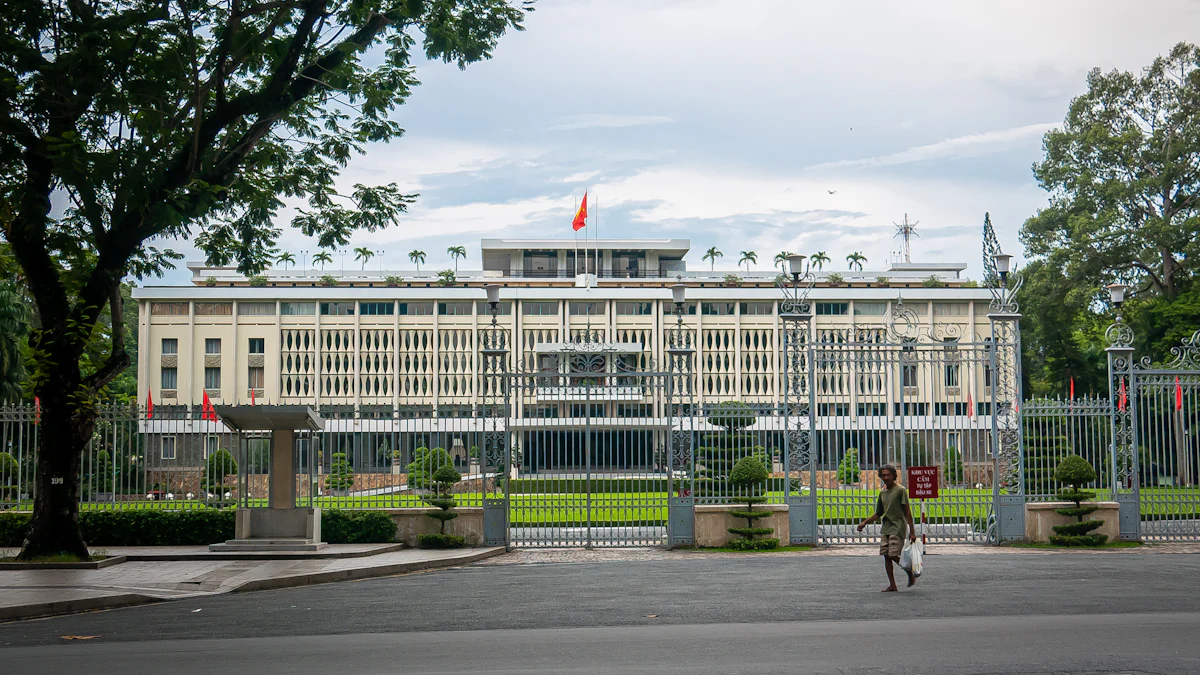The Vietnam War: The Definitive Illustrated History

The Vietnam War is a significant chapter in history, marking a crucial period from 1955 to 1975. This war saw North Vietnam, along with its allies, clashing against South Vietnam and the United States. The Vietnam War resulted in devastating casualties, with 58,000 U.S. troops and over 1,000,000 North Vietnamese soldiers losing their lives. Grasping the history of this war is essential, as it profoundly influenced global politics and left an enduring impact on countless lives. The lessons from the Vietnam War continue to echo in today's world.
Definitive Illustrated History of the Vietnam War
Historical Context and Background
Colonial History of Vietnam
The colonial era in Vietnam began with French control in the mid-19th century. The French sought to exploit Vietnam's resources, imposing their culture and economic systems. This period saw significant resistance from the Vietnamese people. The struggle for independence culminated in the Battle of Dien Bien Phu in 1954. The Vietnamese forces defeated the French, ending nearly a century of colonial rule in Indochina. The Geneva Conference of 1954 followed, leading to the temporary division of Vietnam into North and South. This division set the stage for future conflict.
Rise of Communism
Communism gained momentum in Vietnam during the early 20th century. Ho Chi Minh emerged as a prominent leader, advocating for a communist government. The Viet Minh, led by Ho Chi Minh, played a crucial role in resisting French colonial rule. After the Geneva Accord in 1954, North Vietnam came under communist control. The South, however, remained under the U.S.-backed regime of Ngô Đình Diệm. The ideological divide between communism and capitalism fueled tensions, leading to the Vietnam War. The United States became involved to prevent the spread of communism, marking the beginning of years of guerrilla warfare.
Key Players in the Vietnam War
North Vietnam and the Viet Cong
North Vietnam, led by Ho Chi Minh, played a pivotal role in the Vietnam War. The government aimed to reunify Vietnam under communist rule. The Viet Cong, a guerrilla force, supported North Vietnam's efforts. They engaged in unconventional warfare tactics, challenging the more technologically advanced U.S. forces. The determination of the North Vietnamese and the Viet Cong proved formidable. Their resilience became a defining feature of the conflict.
South Vietnam and the United States
South Vietnam, under the leadership of Ngô Đình Diệm, relied heavily on U.S. support. The United States viewed the Vietnam War as a crucial front in the fight against communism. American involvement escalated, with significant military and economic aid provided to South Vietnam. The U.S. faced challenges in adapting to the guerrilla warfare tactics employed by the Viet Cong. Despite technological superiority, the lack of clear victory led to growing domestic opposition. The war's impact on American society was profound, with Vietnam veterans facing long-term effects. The conflict remains a controversial chapter in U.S. history.
Major Events and Turning Points in Vietnam War History

Early Stages of the Conflict
Gulf of Tonkin Incident
The Gulf of Tonkin Incident occurred in August 1964. North Vietnamese torpedo boats allegedly attacked two U.S. destroyers. President Lyndon B. Johnson responded with retaliatory bombing. Congress passed the Gulf of Tonkin Resolution. This resolution granted Johnson authority to increase military presence in Vietnam. The incident marked a significant escalation in U.S. involvement.
Operation Rolling Thunder
Operation Rolling Thunder began in March 1965. The United States launched a sustained bombing campaign against North Vietnam. The goal aimed to weaken North Vietnam's ability to wage war. The operation targeted key infrastructure and supply routes. Despite extensive bombing, North Vietnam's resolve remained strong. The campaign continued until November 1968.
Escalation and Key Battles
Tet Offensive
The Tet Offensive started in January 1968. North Vietnamese and Viet Cong forces launched a series of surprise attacks. Major cities and military bases in South Vietnam faced intense assaults. The offensive aimed to incite rebellion among the South Vietnamese population. Although militarily unsuccessful, the offensive shocked the American public. Domestic support for the war significantly declined.
My Lai Massacre
The My Lai Massacre occurred in March 1968. U.S. soldiers killed hundreds of unarmed Vietnamese civilians. The massacre took place in the village of My Lai. News of the atrocity reached the American public in 1969. Outrage and condemnation followed. The event intensified anti-war sentiment in the United States. The massacre became a symbol of the war's moral complexities.
Impact and Consequences of the Vietnam War
Political and Social Effects
Anti-War Movement
The Vietnam War sparked a powerful anti-war movement in the United States. Millions of people took to the streets to protest U.S. involvement. The movement became one of the largest public protests in American history. High-profile opposition led to mass demonstrations and riots. The 1968 Democratic National Convention witnessed significant unrest. Reports of military abuses, like the My Lai Massacre, fueled public outrage. Media coverage played a crucial role in shaping public opinion. Graphic images of the war appeared on television screens across the nation. This exposure intensified the anti-war sentiment.
Changes in U.S. Foreign Policy
The Vietnam War significantly altered U.S. foreign policy. Policymakers faced pressure from strong public anti-war opinions. The government reevaluated its approach to international conflicts. The war highlighted the limitations of military intervention. The United States began to adopt a more cautious stance in foreign affairs. The conflict's impact on domestic politics was profound. Public trust in government decisions weakened. The war's legacy influenced future military engagements.
Legacy of the War
Vietnam's Reunification
Vietnam achieved reunification after the war. North Vietnam emerged victorious in 1975. The country unified under a communist government. The reunification process faced numerous challenges. Economic recovery and rebuilding efforts required significant time and resources. The war left deep scars on the Vietnamese landscape and society. The nation worked towards healing and development in the post-war years.
Long-term Effects on Veterans
The Vietnam War left lasting effects on veterans. Many soldiers returned home with physical and psychological scars. The conflict's impact on mental health became a critical issue. Veterans faced difficulties reintegrating into civilian life. Public perception of veterans varied, with some facing hostility. The war's legacy included increased awareness of veterans' needs. Support systems and programs emerged to address these challenges. The Vietnam War continues to shape discussions on veteran care and mental health.
The Vietnam War presented key insights into the complexities of global politics and warfare. The conflict highlighted the ethical implications of national honor and moral obligations. The war's historical significance lies in its profound impact on both Vietnam and the United States. The lessons learned continue to influence modern foreign policy and public perception. Illustrated histories play a crucial role in conveying these lessons. Visual elements enhance understanding and engagement, providing a comprehensive view of events. Such resources ensure that future generations grasp the enduring legacy of the Vietnam War.
See Also
Battle Tactics: An Authoritative Illustrated Chronicle
The Revolutionary War: An Illustrated Account
US History: An Illustrated Reference Book

